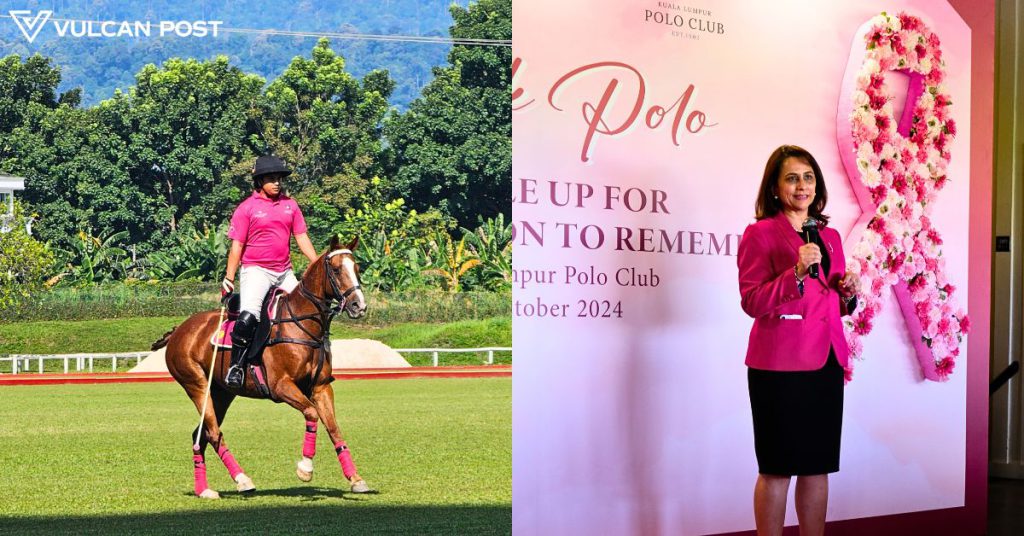Hospital and horses joined forces like I’ve never seen before on one Wednesday in October, at an event witnessed by a community dressed in hues of pink.
This was in celebration of Pink October—Breast Cancer Awareness Month—hosted by Prince Court Medical Centre at Kuala Lumpur Polo Club (KLPC).
Guests, players, and even the gorgeous horses donned pink clothes and accessories, serving looks that my colleague described as “slay”.
It was a sight to behold, and behold I did as the event kicked off with a game of polo.
For those unfamiliar with the sport, a few quick fun facts:
- It’s one of the world’s oldest known team sports
- It’s been called “the sport of kings”
- Initially played by Persian nobility, it’s today played by high society globally
Prince Court Medical Centre and KLPC faced off in a friendly game, and though competition was fierce, KLPC ultimately emerged victorious.
Perhaps fiercer though were the stories from survivors of breast cancer, who took the stage and shared how they took back control of their lives.
From their stories, a few things were clear: We need lots more breast cancer awareness and education in Malaysia, and there are still many misconceptions floating around.
To tackle these, a few doctors stepped up to the stage as well. Here are some myths about breast cancer that they masterfully broke down.
Myth #1: Genetics are the main cause of breast cancer
Unfortunately, Dr. Harjit Kaur, Consultant Breast & Endocrine Surgeon at Prince Court Medical Centre, said that only 10% of breast cancer cases can be traced back to genetics.
Scarily, we still don’t know what causes the remaining 90% of cases, as many patients do live healthy lifestyles and have no family history of breast cancer.
Myth #2: Men don’t get breast cancer
While over one in 10 women account for new cancer diagnoses annually, men are part of the overall statistic too. It’s found that men make up about 1% of breast cancer diagnoses.
So, whether you’re a man who suspects you’re at risk of getting breast cancer or simply want to be on the safe side, here are some symptoms to look out for.
Myth #3: Only older women are at risk
Younger women can get breast cancer too. Dr. Harjit said that the average age of breast cancer patients these days are in their 30s or 40s.
This makes it all the more important that younger women go for health check-ups where early detection is possible. Getting a head start on health insurance would be good too, as it can help with one’s financial situation if they’re still young in their career.
Something to note as well is that younger women with breast cancer don’t face the same challenges as older women with the diagnosis. For example, treatment can affect fertility, and younger women under treatment can actually be pushed into menopause, according to Dr. Harjit.
Myth #4: A breast cancer diagnosis is a death sentence
Maybe it once was, but not anymore. With early screening and timely treatment, breast cancer is becoming more chronic than terminal, Dr. Harjit said. “More people are living with cancer than dying from it,” she summed up.
And speaking of treatment…
Myth #5: A mastectomy is the only way to prevent recurring breast cancer
Dr. Melissa Tan, Consultant Breast & Oncoplastic Surgeon at Prince Court Medical Centre set the record straight, saying that the removal of breasts don’t necessarily improve overall survival of a patient.
“Removing the whole breast is no better than the lump surgery that conserves breast tissue (lumpectomy),” she said.
“There are now technologies to remove larger lumps while conserving the remaining breast tissue, plus a lot more techniques.”
Local therapy (like targeted surgery), systemic therapy (like chemotherapy), and even novel treatments (those in the early part of clinical testing) are all options that can prevent breast cancer from coming back, without the removal of the entire breast.
Myth #6: Fighting breast cancer is a lonely journey
Experiencing a sense of isolation after a breast cancer diagnosis (or even successful treatment) is said to be common, and some of the survivors at the Pink Polo event said the same.
But it doesn’t actually have to be that way, because there are several strong communities out there full of survivors who have gone through similar trials.
Locally, we have Breast Cancer Welfare Association Malaysia (BCWA) and National Cancer Society of Malaysia (NCSM), for example.
And from what I saw on the day of the event, these women’s tight bonds with one another aren’t to be messed with.
-//-
At the start of the event, Ms Sumitra Selvaraj, Public Relations & Partnerships Manager of BCWA said something that stuck with me to the end:
This year has been record breaking for all the wrong reasons, because we’ve been detecting more and more cases.
But hold your horses.
This is not something that’s bad per se, because it means that more people are getting screened and tested, and as mentioned in point #4, early screening and treatment ensure that a diagnosis is no longer a death sentence.
Although Pink October may be over by the time this article is out, there’s no right or wrong time to educate oneself about all things breast cancer.
You may even be eligible to get free breast cancer screening through organisations like BCWA, so why not take this as a sign to schedule a screening sometime soon?
All Images Credit: Vulcan Post
